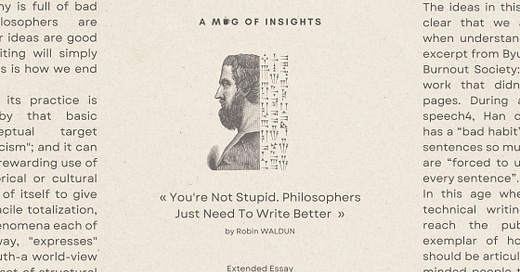You're Not Stupid. Philosophers Just Need To Write Better
Case Study: How Byung-Chul Han Merges Philosophy With Poetry
This is another post for paid subscribers. Paid members will get access to the full archive and all of my extended essays with further reading lists. And on average, subscribers will get 50% more posts from our regularly scheduled program. This will give me more time (alongside grad school research) to produce high-quality posts consistently. Thank you for your contribution!
The field of philosophy is full of bad writing. Most philosophers are convinced that if their ideas are good enough, then the writing will simply take care of itself. This is how we end up with prose like this:
As for periodization, its practice is clearly enveloped by that basic Althusserian conceptual target designated as "historicism"; and it can be admitted that any rewarding use of the notion of a historical or cultural period tends in spite of itself to give the impression of a facile totalization, a seamless web of phenomena each of which, in its own way, "expresses" some unified inner truth-a world-view or a period style or a set of structural categories which marks the whole length and breadth of the "period" in question (Jameson 12)1.
That was one sentence that ballooned into a paragraph from The Political Unconscious. Its author Fredric Jameson won The Bad Writing Contest2 (sponsored by the Philosophy and Literature Journal) in 1997. The judges even went as far as to say that Jameson was
“A man who on the evidence of his many admired books finds it difficult to write intelligibly and impossible to write well.”
On the other end of the extreme, you’ll end up with a philosopher who writes like this:
Today’s society is no longer Foucault’s disciplinary world of hospitals, madhouses, prisons, barracks, and factories. It has long been replaced by another regime, namely a society of fitness studios, office towers, banks, airports, shopping malls, and genetic laboratories. Twenty-first-century society is no longer a disciplinary society, but rather an achievement society (Han 8)3.
The ideas in this paragraph are so clear that we almost feel guilty when we understand them. This is an excerpt from Byung-Chul Han’s The Burnout Society: a groundbreaking work that didn’t go beyond 50 pages. During a commencement speech4, Han confessed that he has a “bad habit” of condensing his sentences so much that his readers are “forced to underline each and every sentence”.
In this age where academic and technical writing can’t seem to reach the public, Han is the exemplar of how complex ideas should be articulated. Academically minded people tend to place their pride before the readers’ understanding. Inaccessibility becomes a badge of honour at the expense of the life-affirming power of ideas.
So, in this post, I would like to draw from two interviews with Byung-Chul Han (the guy rarely accepts interviews so these are solid gems) and write a case study on his philosophy of writing. Because his genius doesn’t lie in his ideas alone, but in his articulations of them.
1: “I Don’t Try to Write. I Receive Thoughts.”
The recent EL PAÍS interview5 with Byung-Chul Han in October painted him as a “somewhat eccentric guy” and a “proudly lazy thinker”. He showed up to the interview 15 minutes late on a bike, refused a typical Q&A format and rambled about whatever came to his mind.
When his mind drifted to his writing process, he confessed that he “writes little”:
“I’m extremely lazy. I work in the garden most of the time and play the piano. And then, maybe I sit at my desk for an hour. Maybe I write three sentences a day, which then becomes a book.”
Han prefers to “receive thoughts” without forcing them. “I don’t claim authorship of my books: that’s why the words in them are wiser than I am,” he said, “they have to interview my books, not me. I’m an idiot.”
This way of writing contrasts with how schools taught us to write. Teachers assign us “word counts” we have to hit, so we resort to waffling and purple prose when we fall short. And when writers forget to grow out of the habit, they end up filling up hundreds of pages with little substance.
On the other hand, “letting words come to you” is more demanding than writing run-ons. It requires patience. Writing an insightful and condensed sentence could take hours after multiple drafts. It also requires humility. The writer has to accept that sometimes ideas move in unpredictable ways beyond their control.
In Han’s book Absence6, he explained that in Eastern philosophy, writing is viewed as a “subjectless happening (Han 77).” As Yoshida Kenkō wrote in Essays in Idleness:
Keep reading with a 7-day free trial
Subscribe to A Mug of Insights to keep reading this post and get 7 days of free access to the full post archives.





